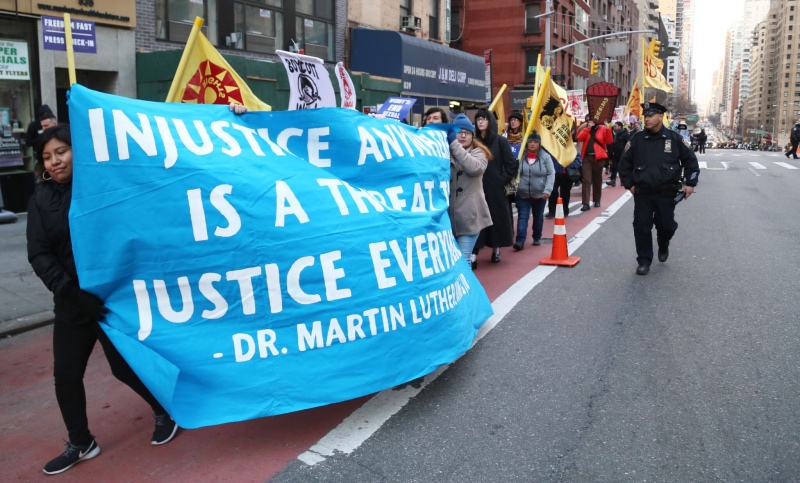
Far-reaching power of Fair Food Program model to eliminate sexual harassment and assault lifted up by Time’ Up Entertainment: The CIW “used consumer power to push those farms that have no incentive to take action, and in doing so changed the worker power dynamic. We have to think of something for this industry that changes the power structure.”
Since the national rise of the #MeToo movement, workers from across a wide spectrum of workplaces in the U.S. – from the movie sets of Hollywood and the halls of our nation’s hospitals to the back kitchens of restaurants and the country’s agricultural fields – declared that the time had come to bring an end to sexual violence in the workplace. Two years since #MeToo became a national phenomenon, this powerful public movement has entered a new phase: With the ubiquitous nature of sexual harassment now plainly exposed, how does the movement take the next step toward lasting, transformational solutions?
For farmworkers across the Eastern Seaboard, the solution is crystal clear: The unparalleled power of the Fair Food Program is that next step. With its wall-to-wall education on the right to work free from sexual violence, paired with a swift and effective complaint resolution mechanism and clear auditing protocols – and backed by market consequences when violations do occur – the Fair Food Program has yanked up the stubborn roots of sexual harassment and assault in the fields. PBS Frontline called the FFP “unique” in the country as a preventative program to address sexual violence. The Harvard Business Review, the New York Times, the CNN Freedom Project, The Nation, Civil Eats, the United Nations SHIFT Project, and the Equal Economic Opportunity Commission declared the Fair Food Program one of the country’s (if not the world’s) most successful models to address sexual harassment in the workplace.
In the words of Alejandrina Carrera, a farmworker on a Fair Food Program farm today who told CNN of her experience as the victim of sexual violence in the fields twenty years ago at the age of 14, “You can work freely. You’re not going to be harassed. You’re not going to be insulted. There’s more respect now.”
The transformative impact of the model established by the Fair Food Program has not gone unnoticed. In the fashion industry, the Model Alliance partnered with the CIW to design and launch the RESPECT Program, built to protect models from sexual harassment and health and safety hazards (LINK). In Hollywood, actors like Alyssa Milano and Amy Schumer have not only lifted up the model and its impact, but jumped in to lend their support to the Fair Food movement, calling on major fast food hold out Wendy’s to join the FFP. In an op/ed in The Wrap this past spring, Alyssa Milano declared:
The Immokalee workers’ laser focus on power is a lesson for us all, as we stand up and declare Time’s Up on sexual harassment and assault. Sexual violence is a crime of power. Redress the underlying imbalance of power and we can end it…
…We all need to take a page from the Immokalee workers’ book across all work environments, including and starting with the entertainment industry. We can eradicate sexual harassment and violence for the next generation. All we have to do is make it bad for business.
Now, that hopeful message is spreading. Last month, the leaders of Time’s Up Entertainment, the entertainment arm of the Time’s Up organization that emerged from the #MeToo movement in Hollywood to address sexual harassment and assault, addressed a room full of film editors and post-production professionals to talk about the future of the Time’s Up movement in Hollywood. Having identified major obstacles to entertainment workers’ ability to safely and accessibly report abuse – and then to see an effective investigation and appropriate consequences follow – Nithya Raman, former executive director of Time’s Up Entertainment, and Mara Nasatir, the organization’s director of initiatives, pushed the crowd to “think of something for this industry that changes the power structure.”
And for the best example out there of transformational change, Ms. Raman turned to none other than the CIW’s Fair Food Program. For a full accounting of the event, we turn to CineMontage, the online hub of the Motion Pictures Editors Guild. Here are some excerpts from their article, “Time’s Up Takes on Latest Frontier in Battle Against Sexual Harassment and Inequality: Post-Production”, which offers a fascinating window into the entertainment industry’s discussions on uprooting sexual harassment and inequality:
On Wednesday evening (Aug. 21), Motion Picture Editors Guild members and guests from other unions gathered to hear two representatives of Time’s Up Entertainment address the topic of sexual assault, harassment, and inequality in the workplace.
Time’s Up Entertainment is the entertainment industry arm of Time’s Up, a workplace safety and advocacy organization. It was the first time that Time’s Up Entertainment has visited a below-the-line industry gathering, according to MPEG National Executive Director Cathy Repola.
Repola introduced the presentation, welcoming Local 700 members as well as other locals including Locals 33, 44, 729, 800, and 871. She stressed her goal of bringing the message of Time’s Up to more members.
Nithya Raman, former Time’s Up Entertainment executive director and current consultant provided background on the impetus behind the group, which arose in response to the sexual misconduct and rape allegations surrounding producer Harvey Weinstein in 2017. Raman shared the stage with Time’s Up Entertainment’s director of initiatives Mara Nasatir, who led much of the discussion.
Women in the industry identified safety and equity as the two major issues to address, Raman said. “Going forward, we’re looking at both of these issues as interconnected,” said Raman …
… During a discussion of options for legal recourse, Raman pointed out that it takes 10 months on average for the U.S. Equal Employment Opportunities Commission (EEOC) to investigate a complaint. And although California state laws are stronger than elsewhere, the process can still be onerous and drawn out, a problem in an industry of temporary workplaces. “Mara and I found out how poor a fit the traditional employer/employee response is to the entertainment workplace. That’s why we have to come up with systems that work for us in our employment context.”
Raman said that in the future, Time’s Up Entertainment will continue to focus on specific ways to help the entertainment industry.
“As far as safety in entertainment, one of the things we’ve been doing is researching what’s been done in other industries,” she said. “We don’t feel any individual union can solve it on its own.”
In other industries, where working conditions can make it hard to protect workers, there have been models that worked to reduce sexual misconduct and other kinds of abuses like wage theft. Raman pointed to the Coalition of Immokalee Workers in Florida, which organized farmworkers who worked in tomato farms across the state. Such models provide inspiration for how effective interventions in the entertainment industry could also be structured.
“The buyers of the tomatoes forced the farms to sign a pledge that they will investigate complaints,” said Raman. “They used consumer power to push those farms that have no incentive to take action, and in doing so changed the worker power dynamic. We have to think of something for this industry that changes the power structure. We have the ability to do this, and the unions and guilds need to push for it.
You can read the article in full here.

